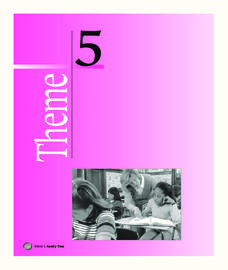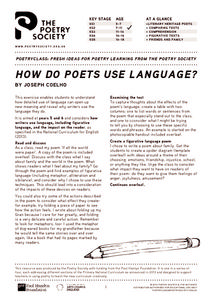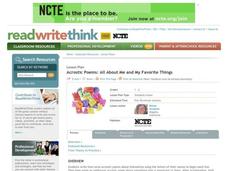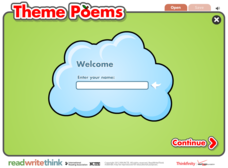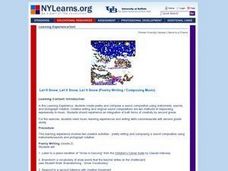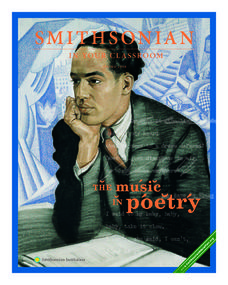Houghton Mifflin Harcourt
Around Town: Neighborhood and Community: English Language Development Lessons (Theme 3)
Here is a unit designed to support English language development. Scholars speak, move, and write to learn more about topics that focus on community and local concepts. The series of lessons aids to reinforce concepts including consonant...
Houghton Mifflin Harcourt
Nature Walk: English Language Development Lessons (Theme 2)
Walking in nature is the theme of a unit designed to support English language development lessons. Scholars look, write, speak, and move to explore topics such as camping, woodland animals, instruments, bodies of water, things found at a...
Houghton Mifflin Harcourt
Family Time: English Language Development Lessons (Theme 5)
Support English language development with a family-themed unit consisting of a series of lessons designed to get your scholars moving, looking, speaking, writing, and listening. Conversation topics include birthdays, family...
Poetry Society
How do Poets Use Language?
Why do writers choose the language they do? Here's a resource that has the poet himself answer that very question. Joseph Coelho explains why he chose the words and images he used in his poem, "If All the World Were Paper."
National Council of Teachers of English
Acrostic Poems: All About Me and My Favorite Things
Budding poets create two acrostic poems, one for their name and another using a word of their choice. Over the course of five days, scholars compose, revise, publish, and share their work with their peers.
Houghton Mifflin Harcourt
Talent Show: English Language Development Lessons (Theme 6)
This 32-page packet, the second in the series of support materials for the Houghton Mifflin Harcourt thematic entitled "Talent Show," is designed specifically to support language learners.
Houghton Mifflin Harcourt
Amazing Animals: English Language Development Lessons (Theme 4)
This packet, the second in the series of support materials for the Houghton Mifflin Harcourt thematic units on amazing animals, contains exercises and activities designed for the ESL/ELD classroom.
Scholastic
Comprehension During Independent Reading
Ideal for a language arts class, literary unit, or independent reading assignment, a set of reading worksheets address a wide array of skills. From poetic elements to nonfiction text features, you can surely find a valuable resource in...
Teachnology
Shape (Or Concrete) Poems
Poetry comes in all shapes and sizes. Young writers pick a shape, select words and phrases that describe how the shape makes them feel, and create a shape poem. A raindrop example and step-by-step instructions give your budding poets a...
ReadWriteThink
Theme Poems
Continue celebrating Poetry Month with an interactive whose focus is writing shape, or theme, poems. Young poets choose from nature, school, shapes, sports, and celebration themes. Then, they brainstorm words that have to do with the...
Smithsonian Institution
Water/Ways: The Poetry of Science
Water is the source of life. It appears in poetry in both peaceful and torrential descriptions; it appears in earth science in its liquid, gaseous, and solid states. Combine these interpretations of our planet's most precious and...
K12 Reader
Valentine’s Day Acrostic Poem
Be mine! Young poets use the provided worksheet to craft a Valentine's Day acrostic poem for the word heart.
Curriculum Corner
My Book of Poems
Copy all pages to create a book of poems during a poetry study. From alliteration to cinquain to acrostic poem, your class won't run out of templates for writing poems! Each sheet serves as a template for an entire book of poems. Other...
Read Write Think
Poetry Portfolios: Using Poetry to Teach Reading
Over the course of five periods, scholars create a poetry portfolio. They begin with a reading of the poem, Firefly. With a focus on vocabulary, learners reread the poem then look for sight words and other skills.
Curated OER
Poetry/Music: Let It Snow!
Learners create poems and sound compositions using instruments, sounds, and pictograph notation. After listening Debussy's Children's corner suite, they brainstorm a list of snow vocabulary words. Students write poems and in groups...
ReadWriteThink
Acrostic Poems
What is an acrostic poem? It is one of the many forms of poetry that expresses a particular thought, idea, emotion, or feeling. Play with an interactive that allows young poets to craft a topical acrostic of their choice using an online...
National Council of Teachers of English
A Bear of a Poem: Composing and Performing Found Poetry
Scholars work collaboratively to compose a found poem from one of their favorite stories. With a finished product in hand, class members form a circle and perform their work for an audience by taking turns reciting one line till the poem...
National Council of Teachers of English
Writing Acrostic Poems with Thematically Related Texts in the Content Areas
Scholars scour thematically aligned texts to gather a bank of words they can use in an original acrostic poem.
National Council of Teachers of English
Writing Poetry with Rebus and Rhyme
Young scholars write rhyming poems using rebus. With pictures instead of words, authors create original work about things they love.
Poetry4kids
Playing With Your Food Poem Lesson
What's more fun than playing with your food? Writing a poem about it! A quick and straightforward lesson guides young writers through the steps of writing a funny, well-structured poem about combining sports and food.
National Center for Families Learning
The Summer Fun Summer Learning Poetry Unit
Focus on poetry this summer to enhance those comprehension, fluency, and language skills with a set of resources intended to explore different types of poetry, specifically lyric poetry. The daily activities contain differentiation ideas...
Curated OER
Short Poems Are Scary!
What do all those chairs and pencils do in the classroom once everyone leaves? Allow imaginations to run wild with frighteningly short poems!
Smithsonian Institution
Smithsonian In Your Classroom: The Music in Poetry
Take poetry off the page and put it into terms of movement, physical space and, finally, music with this series of three lessons from the Smithsonian Institution. This resource introduces students to two poetic forms that originated as...
Houghton Mifflin Harcourt
Around Town: Neighborhood and Community: Challenge Activities (Theme 3)
Here is a unit consisting of activities designed to challenge your scholars. The extended learning opportunities include planning a celebration, making a presentation to the class, poster making, writing poetry, a problem-solving...




